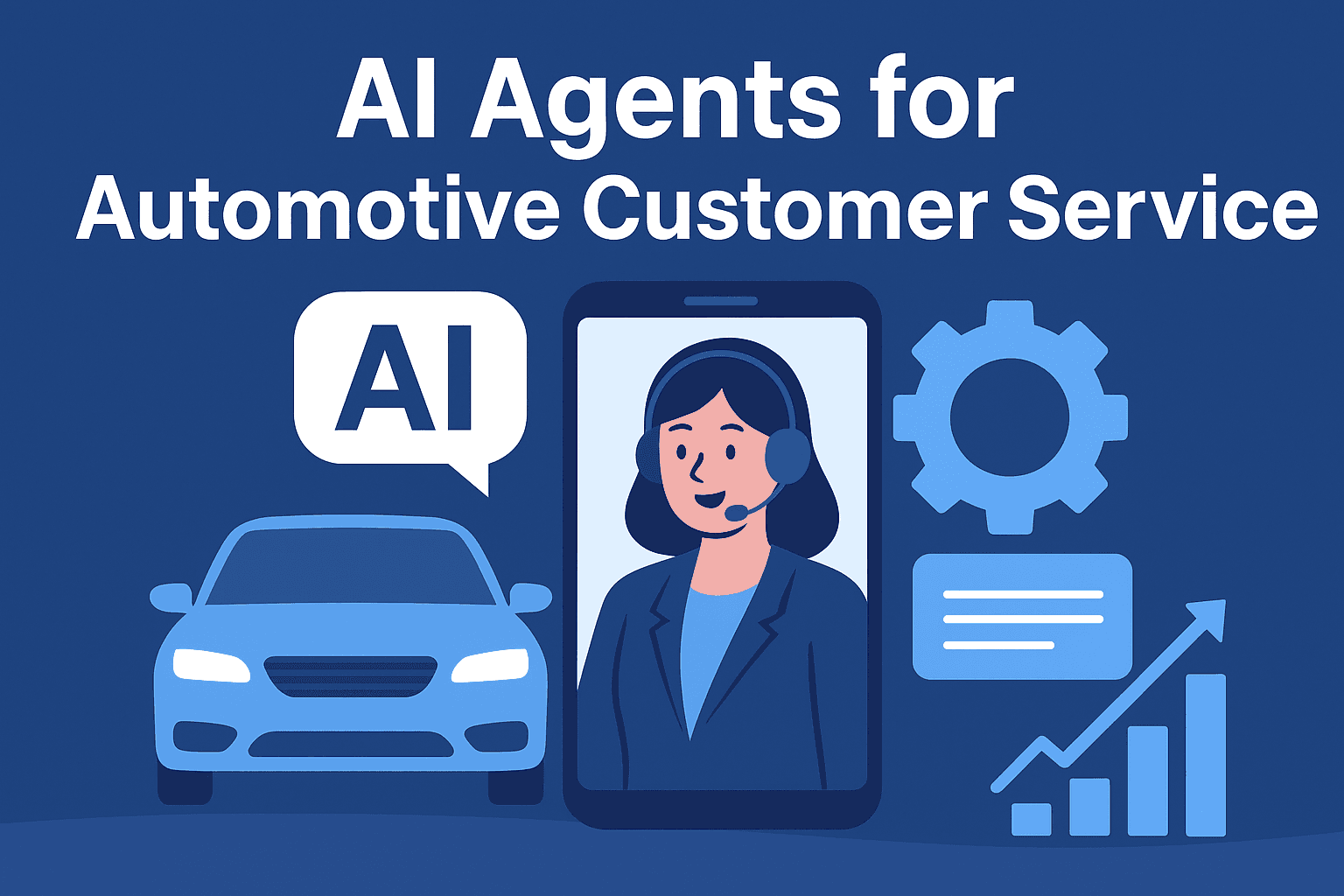

Driving Smarter Support Through AI for Automotive Customer Service
The automotive industry is undergoing a pivotal transformation. What’s at the forefront of this evolution? Artificial intelligence (AI).
As consumer expectations shift, dealerships and service centers are increasingly turning to AI agents to enhance customer interactions, streamline operations and stay competitive in a rapidly changing market. Companies integrating AI into their customer service processes achieve up to a 25% improvement in efficiency, personalization and issue resolution.
Traditional customer service methods often struggle to meet these expectations, leading to longer wait times and customer dissatisfaction. Among those in the mass market segment, 35% of customers select aftermarket service because of the ability to be seen right away, surpassing lower costs as a reason for choosing such service.
AI agents are changing the game by automating routine tasks, providing instant guidance and anticipating customer needs. The technology also enhances efficiency and frees human agents to focus on complex issues.
What Are AI Agents in Automotive Customer Service?
AI agents, sometimes referred to as virtual assistants or conversational AI, are intelligent systems designed to interact with customers, answer questions and perform tedious tasks that previously required human intervention.
For automotive businesses, these AI agents are revolutionizing customer support by handling lead qualification, service scheduling, product information and post-sale support. Unlike traditional automation, AI agents use natural language processing (NLP) and machine learning to understand context, predict customer needs and respond in a human-like manner. They help customers quickly find answers to common questions, improving response times and overall satisfaction.
Key Advantages of AI-Powered Automotive Customer Service
In the competitive automotive industry, exceptional customer service can be the difference between a one-time sale and long-term loyalty. Today’s customers expect fast, accurate and personalized support at every stage of their journey, from scheduling routine maintenance to exploring new vehicle options.
AI agents act as intelligent, always-on assistants that streamline interactions, resolve issues quickly and deliver tailored recommendations. They combine automation with data-driven insights to enhance efficiency and create a more satisfying and personalized customer experience. The result is advantages that every automotive business can leverage to stay ahead in an increasingly digital marketplace. These measurable benefits include:
Faster Response Times
AI agents can respond instantly to inquiries across multiple channels, including chat, email and voice, improving first-contact resolution and keeping potential buyers engaged.
Cost Efficiency
Automating repetitive tasks reduces the need for extensive customer support teams, lowering operational costs while maintaining high-quality service.
Personalized Customer Interactions
Modern AI agents analyze past interactions, purchase history and vehicle preferences to deliver tailored recommendations. For example, an AI agent can suggest service packages based on the owner’s driving patterns or notify customers of relevant recalls.
Improved Scalability
AI solutions can scale effortlessly, whether it’s a single dealership or a nationwide network. With AI, handling peak seasons, new vehicle launches or high-volume recall notifications becomes more manageable.
Data-Driven Insights
Every interaction with an AI agent generates data. Integrating AI with customer relationship management (CRM) systems provides full context for each customer interaction, enabling more effective analysis and personalized support. Automotive businesses can analyze these insights to identify common issues, optimize workflows and make informed decisions about product and service offerings.
Real-World Applications of AI for Automotive Customer Service
Several automotive companies have already seen transformative results from AI agents. Virtual sales assistants on dealership websites answer questions about inventory, financing and vehicle features in real-time, qualifying leads before they reach a human sales representative. AI-powered service scheduling bots allow customers to book maintenance appointments, which automatically sync with the dealership’s calendar and service team availability.

Voice-activated AI agents integrated with smart devices and interactive voice response (IVR) systems assist customers by phone, with contact centers using AI to manage high call volumes, improve resolution speed and ensure consistent responses across locations. AI customer support tools can also predict when a vehicle may require servicing based on usage patterns or diagnostic data, proactively reaching out to the owner before problems arise. Successful implementation of AI solutions often involves collaboration between IT, customer service and product management teams to ensure alignment with business goals.
Scheduling and Service Appointments with AI
AI-powered scheduling and service appointment solutions are changing the customer experience in automotive retail. By utilizing AI agents, dealerships can automate the entire scheduling process, from booking appointments to sending reminders, providing customers with instant support and convenience.
AI systems analyze customer behavior and preferences to anticipate customer needs, offering tailored recommendations for service packages or maintenance intervals. This personalized approach not only streamlines operations but also ensures that customers receive the support they need when they need it. Automated scheduling reduces wait times, improves response accuracy and allows staff to focus on delivering exceptional customer experiences.
By embracing AI-powered scheduling, dealerships can enhance efficiency, deliver personalized support and build lasting customer relationships. This drives higher satisfaction and loyalty in an already competitive market.
How to Implement Artificial Intelligence for Automotive Customer Service
Implementing AI in automotive customer service requires a strategic approach. According to PwC’s AI Agent Survey, roughly two-thirds of businesses adopting AI agents report increased productivity, with more than half experiencing cost savings and faster decision-making.
Adopting AI agents requires a strategic approach to maximize return on investment (ROI) and customer satisfaction. This process should encompass the following steps:
1. Mapping Customer Journeys
Identify the most common touchpoints where AI can provide value, including sales inquiries, service appointments, post-purchase support or FAQs.
2. Defining Success Metrics
Track key performance indicators (KPIs), such as response times, lead conversion rates, customer satisfaction scores and repeat service visits, to measure effectiveness.
3. Ensuring Integration
AI solutions should integrate seamlessly with existing systems, including CRM platforms, dealership management software and digital communication channels.
4. Piloting Before Scaling
Start with a few locations or a single department to test AI performance, gather feedback, and refine processes before enterprise-wide deployment.
5. Continuously Training and Optimizing
AI models improve over time with ongoing training, ensuring they stay current with new vehicle information, services and customer expectations.

The Future of Automotive Customer Service
As AI technology continues to advance, its role in automotive customer service will only grow. Future innovations may include hyper-personalized experiences using predictive analytics and customer behavior data, multilingual AI agents to serve diverse customer bases and augmented reality (AR) support for virtual vehicle walkthroughs and repair guidance.
AI for automotive customer service is not just a tool for efficiency. It’s a way to enhance the customer experience, build loyalty and drive revenue growth.
Revmo AI: Revolutionizing Automotive Customer Service
Revmo AI is designed to automate customer interactions, transforming each touchpoint into an opportunity for growth. By integrating seamlessly with existing systems, our platform helps automotive businesses enhance customer service, increase revenue and streamline operations.
Key features and benefits of Revmo AI include:
- 24/7 Availability: Revmo AI ensures that every call is answered, day or night, eliminating missed opportunities and enhancing customer satisfaction.
- Seamless Integration: Our platform integrates with popular CRM systems to efficiently manage appointments and walk-in queues.
- Scalability: Designed to grow with your business, Revmo AI can handle high call volumes and multiple locations, maintaining consistent service quality across all touchpoints.
- Multilingual Support: With the ability to understand and speak 76 unique languages, Revmo AI caters to a diverse customer base, ensuring clear communication regardless of language barriers.
- Data-Driven Insights: Our platform provides actionable analytics, helping automotive businesses understand customer behavior, optimize operations and make informed decisions.
The Real-World Impact of Revmo AI
Automotive service providers have reported substantial improvements after implementing Revmo AI. For instance, SpeeDee Oil Change & Auto Service experienced a $12,000 increase in revenue within the first month, along with a reduction in missed calls from more than 200 to zero. And, Stonebriar Auto Services saw enhanced operational efficiency, with a 70% improvement in call handling and an additional 2,400+ car visits per month across 117 locations.
Schedule a demo today to find out how Revmo AI can rev up your revenue and spark increased customer satisfaction.

Written By Ryan Louis
CEO and Co-Founder
Ryan is a seasoned executive and entrepreneur with more than 18 years of technology consulting, industry and start-up experience.


